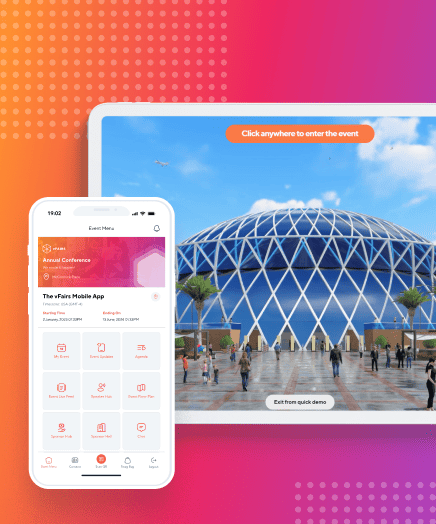Education technology conferences are opening up exciting new opportunities for professionals, researchers, scholars, and academicians to present their ideas and research activities to enrich and invigorate young minds. Through virtual conference platforms, practitioners participating in such EdTech events analyze the needs, put forth their concepts to design and develop learning infrastructures and resources to improve both learning and teaching.
Even though things are shaping up in EdTech, with the onset of the global pandemic many educational institutions are struggling to engage key stakeholders through special networking events in which they come up with strategies for interactive learning, and assessments in distance-learning environments. Therefore to comply with social distancing and lockdown policies and to reach a broader audience, taking education technology conferences online is the only way forward for educational institutions.
Virtual is the new normal
All things considered, virtual is the new ‘normal’ in the wake of the pandemic. Are you finding it difficult to adapt to the new normal? You are not alone. Let’s run down on the benefits of a virtual education technology conference and how you as a communication, marketing, or event professionals hosting such events can ace it. But before getting into that, let’s take a brief sneak peek into a few items.
What is a virtual education technology conference?
Online platforms facilitating education institutions to host EdTech conferences and events across borders. Where education practitioners and industry experts gather to talk about student success through blended learning i.e. the use of technological solutions along with traditional classroom methods. Education leaders network with one another to share strategies about overcoming challenges, successful implementation, instructional models so on and so forth.
Types of EdTech events
Conferences – Events that bring educational professionals and keynote speakers together for workshops and networking activities.
Summits – Include high-level professionals to discuss research findings.
Symposium – Event for EdTech practitioners to give presentations.
Benefits of virtual education technology conference
Reach a wider audience
Potential attendees can participate from wherever they want. Moreover, in-person events are time-consuming since they may include some form of travel. Besides, virtual conferences promote the idea of flexibility and inclusivity. Such as senior citizens, people with health issues, and other disabilities can too feel included. By allowing people to attend virtual conferences, you can set a benchmark for higher ROI.
Offers a cost-efficient solution
On a budget? Then organizing virtual EdTech conferences is a great option for marketing or education professionals. You can save money on booking venues, hiring event planners, setups, takedowns, refreshments, and other accommodations. The only thing you need to worry about is the cost of your hosting platform which is already very nominal.
Lets you measure your success
Collecting and measuring feedback during physical events can be very challenging as you may be unable to keep count of every participant filling out your feedback survey form. Whereas a virtual education technology conference equips you with automated tools to help track KPIs such as the number of registered users and active participants. The collected data is readily available and valuable for measuring the success of your event and what more you can do to improve your future virtual event.
With that being said, organizing a virtual conference may sound effortless but it can be very challenging for the unfamiliar. Make sure you use a platform that offers support throughout the planning and setup process.
Tips for hosting a successful virtual conference
- Have a comprehensive plan that defines how your conference aligns with your goals
- Identify your target audience and the issue you want to address
- Decide on the thought leaders you want to invite including the number of speakers and the budget
- Schedule your event based on availability such as the official date for the launch of your event and other time estimates
- Choose your virtual event platform provider wisely. They play a huge part in the success of your event because immersive experience give people something to remember you by
- Prepare marketing materials and resources for attendees to familiarize themselves with your brand such as presentations, landing pages, and social content for visual identity
- Promote your event through email campaigns. Entice potential attendees with teasers, leverage the power of social media, and try building a community beforehand
Two of the major differences between in-person and virtual events are location and human-to-human interaction.
In physical events organizers and attendees are tied by geographical boundaries. Whereas virtual events allow you to reach a broader set of audiences across different countries and time zones. Additionally, recorded virtual events can help drive more engagement even after the event has been concluded. Weigh down the differences and you can see virtual events leading the race. As far as human-to-human interaction is concerned, that’s the tricky part. The reason why you need to choose an event hosting platform very carefully for your next education technology conference.
Important features of a virtual EdTech event hosting platform

- Virtual event platforms should offer customization features like branded landing pages based on your design guidelines. The landing page should have all the important details about your event such as the registration form, information desk for a smooth journey, and visitor lobbies
- Additionally, they should have branded exhibition halls and exhibit booths such as if it’s a job fair, every university should have its booth for promotion
- Virtual auditorium interface for symposiums
- Interactivity tools, like chat and meeting schedulers, for networking
- Pre-made templates to set up your booths
- Automation features and integrations
- For EdTech conferences, the platform should be able to host speakers and let attendees participate in Q&A and polls
- Should be fully mobile optimized and responsive
- Hosts should be able to measure the success of their events; such as registrations and turnout through analytics and in-built reports
The bottom line
Public events across the world are being postponed or even canceled, which is costing millions to organizations. Even though this virtual paradigm shift might have caught many institutions by surprise and would take some time getting used to. But in order to get the activities going such as EdTech conferences, exhibits, job fairs, etc. virtual events are more important than ever before and offer the only flexible solution. However, at the same time, it is crucial to choose the right virtual event hosting platform. Because by making the right choice, you can not only attract new attendees but also keep them coming back for more.


